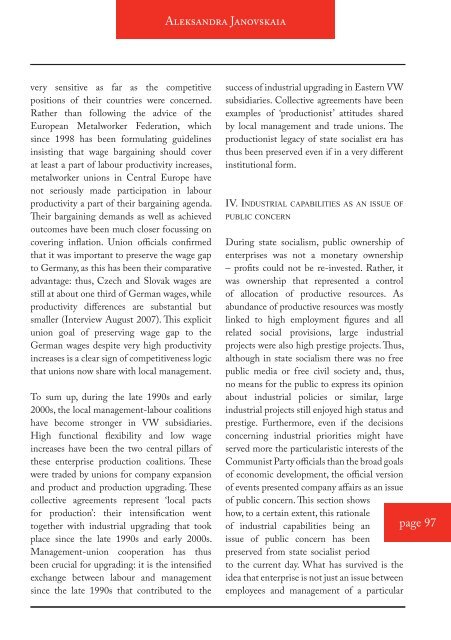Heft36 1 - SFB 580 - Friedrich-Schiller-Universität Jena
Heft36 1 - SFB 580 - Friedrich-Schiller-Universität Jena
Heft36 1 - SFB 580 - Friedrich-Schiller-Universität Jena
Create successful ePaper yourself
Turn your PDF publications into a flip-book with our unique Google optimized e-Paper software.
ALEKSANDRA JANOVSKAIA<br />
very sensitive as far as the competitive<br />
positions of their countries were concerned.<br />
Rather than following the advice of the<br />
European Metalworker Federation, which<br />
since 1998 has been formulating guidelines<br />
insisting that wage bargaining should cover<br />
at least a part of labour productivity increases,<br />
metalworker unions in Central Europe have<br />
not seriously made participation in labour<br />
productivity a part of their bargaining agenda.<br />
Their bargaining demands as well as achieved<br />
outcomes have been much closer focussing on<br />
covering inflation. Union officials confirmed<br />
that it was important to preserve the wage gap<br />
to Germany, as this has been their comparative<br />
advantage: thus, Czech and Slovak wages are<br />
still at about one third of German wages, while<br />
productivity differences are substantial but<br />
smaller (Interview August 2007). This explicit<br />
union goal of preserving wage gap to the<br />
German wages despite very high productivity<br />
increases is a clear sign of competitiveness logic<br />
that unions now share with local management.<br />
To sum up, during the late 1990s and early<br />
2000s, the local management-labour coalitions<br />
have become stronger in VW subsidiaries.<br />
High functional flexibility and low wage<br />
increases have been the two central pillars of<br />
these enterprise production coalitions. These<br />
were traded by unions for company expansion<br />
and product and production upgrading. These<br />
collective agreements represent ‘local pacts<br />
for production’: their intensification went<br />
together with industrial upgrading that took<br />
place since the late 1990s and early 2000s.<br />
Management-union cooperation has thus<br />
been crucial for upgrading: it is the intensified<br />
exchange between labour and management<br />
since the late 1990s that contributed to the<br />
success of industrial upgrading in Eastern VW<br />
subsidiaries. Collective agreements have been<br />
examples of ‘productionist’ attitudes shared<br />
by local management and trade unions. The<br />
productionist legacy of state socialist era has<br />
thus been preserved even if in a very different<br />
institutional form.<br />
IV. INDUSTRIAL CAPABILITIES AS AN ISSUE OF<br />
PUBLIC CONCERN<br />
During state socialism, public ownership of<br />
enterprises was not a monetary ownership<br />
– profits could not be re-invested. Rather, it<br />
was ownership that represented a control<br />
of allocation of productive resources. As<br />
abundance of productive resources was mostly<br />
linked to high employment figures and all<br />
related social provisions, large industrial<br />
projects were also high prestige projects. Thus,<br />
although in state socialism there was no free<br />
public media or free civil society and, thus,<br />
no means for the public to express its opinion<br />
about industrial policies or similar, large<br />
industrial projects still enjoyed high status and<br />
prestige. Furthermore, even if the decisions<br />
concerning industrial priorities might have<br />
served more the particularistic interests of the<br />
Communist Party officials than the broad goals<br />
of economic development, the official version<br />
of events presented company affairs as an issue<br />
of public concern. This section shows<br />
how, to a certain extent, this rationale<br />
of industrial capabilities being an<br />
page 97<br />
issue of public concern has been<br />
preserved from state socialist period<br />
to the current day. What has survived is the<br />
idea that enterprise is not just an issue between<br />
employees and management of a particular
















